'This should be a jewel of the world heritage site'
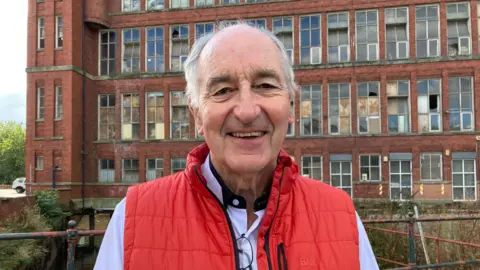 BBC
BBC"This building is in a dire strait."
The gloomy assessment of Derek Latham, chairman of the Derbyshire Historic Buildings Trust, as he stands and surveys Belper Mills, a historic site dating back to 1804.
It forms part of the Derwent Valley Mills - a world heritage site situated along a 15-mile stretch of river between Cromford and Derby.
These historic buildings were awarded world heritage status in 2001 but that could now be at risk after the United Nations Educational, Scientific and Cultural Organization (Unesco) said it had "grave concern" about the area's future.

World heritage status places the area on a similar footing to the Taj Mahal in India, the pyramids of Giza in Egypt and the Great Wall of China.
But Unesco has cited repeated "inappropriate" developments in the area as cause for concern, and highlighted the "poor condition of the Belper Mills complex".
Most of the site - which campaign group Our Belper Mills says lays claim to being the first iron-framed building in the world - is disused.
The main buildings appear to be in a state of disrepair with broken windows and weeds growing through the brickwork.

Mr Latham says he is shocked at the potential risk of the site losing its Unesco status.
"It really is the cradle of the industrial revolution, along with Ironbridge in Telford," he said.
Looking at Belper Mills, he said he thought Unesco must have questioned, "how on Earth could it still be in this state?"
Mr Latham is urging the current owner of the building, First Investments Real Estate Management, to sell it to Derbyshire County Council.
Alternatively, he would like the authority to enforce an urgent works notice, to force the owner to carry out repairs.
"It can be part of a major regeneration of this part of Belper, not only to rescue it, but to turn it into a jewel of the world heritage site, which it deserves to be," he said.
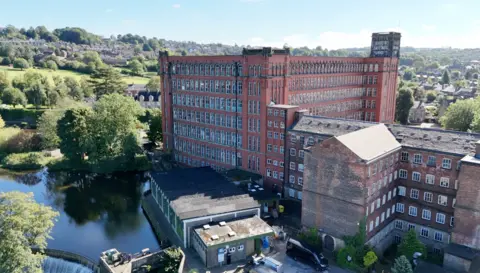
A council spokesperson said the authority was "not in a financial position" to buy and restore Belper Mills, but would work with "all partners to see how we can best support" their preservation.
Barry Lewis, leader of the county council, is also chairman of the Derwent Valley Mills Partnership.
He said: "It's vitally important that we continue to protect the world heritage site and we will make every effort to address the concerns of Unesco.
"But the Derwent Valley Mills are in a position whereby they are split across a number of different local authority areas along the River Derwent and into the city of Derby, and the concerns raised do highlight the competing needs of sensitive heritage redevelopment and housing and business development in an urban setting.
"With many of the buildings in private ownership, which are outside the control of the Derwent Valley Mills Partnership, maintaining and developing the site is a complex enterprise which relies on the collaboration and co-operation of many different organisations.
"We welcome the guidance from Unesco and we are now consulting with partner organisations to agree how the partnership can best respond to the world heritage committee's recommendations for the future benefit of this unique site."
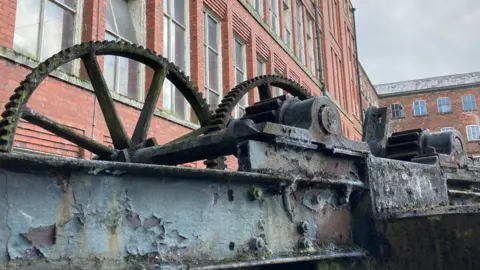
The results of a consultation, commissioned by the county council on behalf of the Derwent Valley Mills World Heritage Site (DVMWHS) Partnership in February 2023, suggested the Belper Mills site could be saved and become a mix of residential and commercial use.
The BBC has contacted First Investments Real Estate Management for comment, but so far the company has not responded.
Belper Mills was not the only location cited as a cause for concern.
Unesco also wants the government to reconsider approval of The Landmark development on a former car park in Derby.
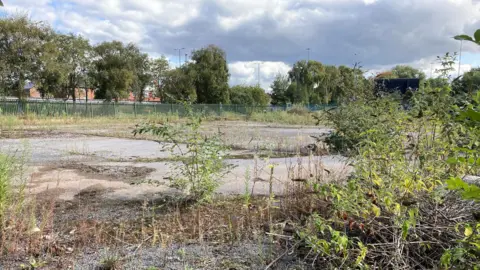
The site sits just 150m (500ft) from the former Silk Mill site, considered to be the world's first mechanised factory.
If built, the 17-storey tower, with more than 200 apartments, would be one of Derby's tallest buildings.
At the moment, the site is fenced off with no sign of activity.
The Godwin Group, which owns the site, said: "While recent market conditions have slowed progress on The Landmark, development of the scheme continues, and we are actively exploring options for delivery, either independently or through a partnership.
"We will provide further updates as soon as they become available."
 Godwin Group
Godwin GroupCromford Mills in Matlock - built in 1771 by Sir Richard Arkwright - was the world's first successful water-powered cotton spinning mill.
It also forms part of the Derwent Valley heritage site and was praised in Unesco's report for the mixed-use redevelopment of the mill.
Sarah Wheatley, who runs a shop called WeaveKnitit at the site, is worried about the potential impact if the area's world heritage status was revoked.
"We have a lot of tourists that come because of the status, to see what it is and what people are doing with the buildings now," she said.
One visitor - Linda Walker, from Long Eaton in Derbyshire - said: "I don’t think people would necessarily come here if it wasn't a Unesco site."

Meanwhile, Arkwright Society chief executive Eilis Scott welcomed Unesco's feedback and said the heritage status "recognises just how special this place is".
"There are a number of recommendations that recognises the good work that we've been doing and the importance of Cromford Mills and the Derwent Valley," she said.
"It also recognises that we need continued support.
"We have a number of mill buildings that we need to transform into new uses and income-generating uses."
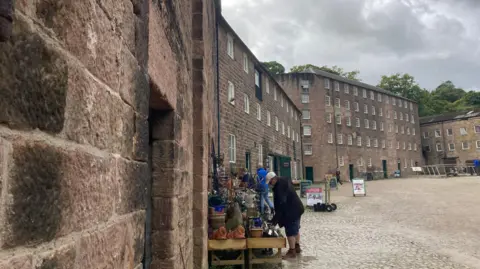
So how likely is it the Derwent Valley Mills could lose its Unesco endorsement?
Liverpool was stripped of its world heritage status in 2021 after a UN committee found developments had threatened the value of the city's waterfront.
But Mr Lewis does not think the world heritage site is close to suffering a similar fate.
He does, however, agree with Unesco's criticism of the Belper Mills site, which he said was in "an astonishingly poor condition".
He said there was millions of pounds of "conservative deficit in that building, meaning it would cost tens of millions of pounds more to put it right because it is a conservation listed building".

Mr Lewis thinks the area's local authorities - including the county council he leads - need to work together to ensure any development is as appropriate as possible.
Similarly, Nadine Peatfield, leader of Derby City Council, says the authority will "continue to liaise" with Unesco.
"We take the Unesco report very seriously and we have reviewed that report," she said.
"We treasure our world heritage site and we want to do everything we can to protect that, of course, but at the same time it is in conflict with some of the demands we have within the city on housing, redevelopment and regeneration."
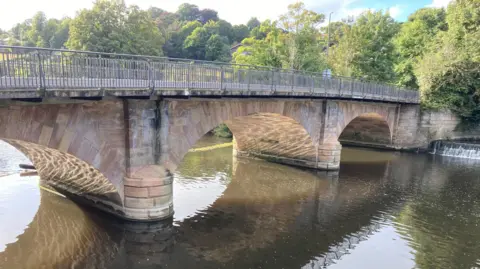
The Derwent Valley Mills World Heritage Steering Group will write a response to Unesco, which will be put forward through the UK government by February 2025.
Follow BBC Derby on Facebook, on X, or on Instagram. Send your story ideas to [email protected] or via WhatsApp on 0808 100 2210.
